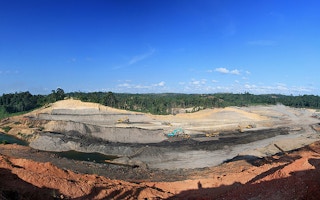As Indonesia proceeds with its campaign to stamp out illegality in its palm oil and mining sectors, canceling thousands of permits nationwide, a Sumatran court has restored a coal company’s license after the governor revoked it.
Activists fear the verdict could set a precedent for similar cases.
The company, PT Batubara Lahat, had its license to mine coal withdrawn by the South Sumatra governor in November 2016, after the mining firm was found to owe the government more than 27 billion rupiah (~$2 million) in royalties and other non-tax obligations.
On June 8, the Palembang State Administrative Court annulled that decision, reinstating the company’s Mining Business License (IUP).
Rabin Ibnu Zainal, director of Pilar Nusantara, an NGO monitoring coal mining in South Sumatra, told Mongabay-Indonesia his organisation had not yet received a copy of the court’s verdict. However, he said, the court gave two justifications for overturning the governor’s decree.
First, the court reasoned that the Audit Board of Indonesia — part of the central government — is responsible for calculating royalties and non-tax revenues owed by coal companies. Thus, the court decided, revocation of permits on grounds of delinquent payments should be carried out by Jakarta rather than regional officials.
Second, Zainal said, the court reasoned that if the company’s mining license were revoked, it would be difficult to collect its unpaid debts.
Zainal said he was shocked by PT Batubara Lahat’s victory in court. “We are also getting news that the South Sumatra government will appeal the decision,” he added.
In the meantime, however, activists fear this verdict could embolden other companies whose licenses have been challenged or revoked by local authorities.
Cleaning up the mining sector
Indonesia’s 2009 Mining Law gave local governments the right to issue mining licenses, prompting an explosion in the number of permits granted.
By 2014, numerous reports by civil society groups had detailed corruption, legal violations and environmental and social damage connected to these licenses, prompting the KPK, Indonesia’s anti-graft agency, to mount an investigation into the sector. In cooperation with the Ministry of Energy and Mineral Resources and the Ministry of Environment and Forestry, the KPK set out to examine the legality of mining permits in 12 provinces.
This investigation revealed that around 40 per cent of the 10,992 licenses issued in these provinces were not “clean and clear” — meaning they failed to meet all legal requirements, including registration to pay taxes, land rents and other royalties.
In South Sumatra, the ratio was found to be even worse. Out of 359 IUPs issued by the South Sumatra government, the KPK considered only 175 to be suitable for operation.
Thirty-one companies granted permits were found to have no taxpayer identification number. Additionally, out of 241 companies that were paying taxes, only 18 reported the basis for their tax calculations.
By April 2017, more than 2,100 mining permits nationwide had been revoked or left to expire without being renewed.
In South Sumatra, the government revoked 34 licenses and did not renew an additional 43.
Eight of these mining companies, including PT Batubara Lahat, have sued either the South Sumatra governor or the head of energy and mineral resources for South Sumatra, claiming these local authorities acted arbitrarily. So far, only PT Batubara Lahat has prevailed in court.
Setting a precedent
Zainal predicted that PT Batubara Lahat’s victory will step-up resistance efforts by coal mining companies. “We hope these other verdicts are not like PT Batubara Lahat’s. Coal companies operating in Indonesia, especially in South Sumatra, must operate correctly, not only not damaging the environment but also not harming the state,” he said.
As of last month, coal companies owed the Indonesian government more than 5 trillion rupiah ($380 million), meaning the public has been denied its fair share of the wealth gained through mining while being left to deal with the social and environmental fall-out.
Poorly regulated mining operations have left villages across the archipelago to face problems ranging from polluted waterways to deadly abandoned mining pits in which at least 27 people have drowned.
Meanwhile, actions in other regions demonstrate just how high the stakes are when it comes to legal conflicts between mining companies and local governments. An evaluation team chaired by the East Kalimantan provincial secretary ruled on June 6 that 809 mining licenses should be revoked in that province.
However, a deadline for these revocations has not yet been confirmed, with local officials citing concerns that companies whose licenses are revoked will simply walk away from their mines, leaving behind unpaid debts and open mining pits — a concern that echoes the reasoning of the Palembang court in the PT Batubara Lahat case.
This story was reported by Mongabay’s Indonesia team and was first published on our Indonesian site on June. 10, 2017. Republished with permission.

















